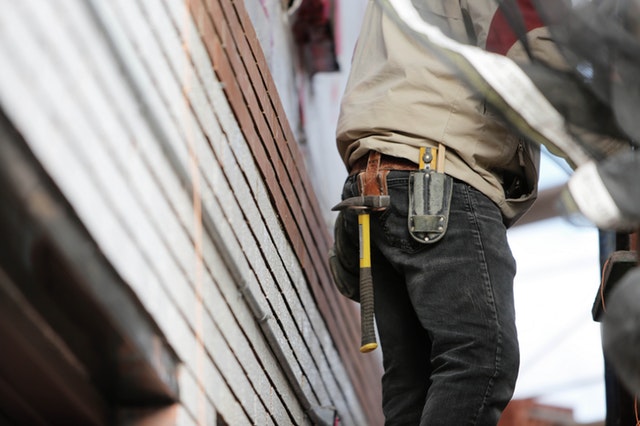 The COVID-19 (Coronavirus) pandemic has impacted every industry across the country. Many people are being asked to shelter in place and everyone has been asked to practice social distancing to try to curtail the spread of this deadly virus.
The COVID-19 (Coronavirus) pandemic has impacted every industry across the country. Many people are being asked to shelter in place and everyone has been asked to practice social distancing to try to curtail the spread of this deadly virus.
The Federal Housing Finance Agency (FHFA) has asked both Freddie Mac and Fannie Mae to make some changes in the manner they conduct property appraisals and employment verification.
Shortly after the move by the FHFA, The Veteran’s Administration (VA) and Federal Housing Administration (FHA) followed suit by relaxing property appraisal requirements. Due to the unusual circumstances that are facing the country right now, these changes are necessary to keep people safe while minimizing the blow to the economy.
Exterior Inspection Appraisals
One of the critical parts that must happen during the purchase of a home is something called an appraisal. Typically, these appraisals involve an on-site inspection of the home, taking a close look at everything inside to try to make sure the price is as accurate as possible. Now, appraisals can be done on something that is called an exterior-only or “drive-by” basis. This means that appraisers might drive by to confirm that the property exists, but will not physically inspect it.
In some cases, they might just use the computer, find comparable properties, and appraise it in this manner. This is normally referred to as a “desktop appraisal”. This is important for everyone, including those who are Department of Veterans Affairs (VA) home loan borrowers.
Why Appraisals Are Needed Now
Even though fewer people may be currently looking at houses, there are other reasons why an appraisal might be necessary. Many people are looking for sources of emergency funding, particularly as hours get cut and people get laid off.
There are still bills that need to be paid, including utility bills and mortgages. Therefore, many people are looking at taking out a second mortgage as a source of immediate liquidity. Sometimes, an appraisal might be needed to make this happen.
Other Measures Are Being Taken By The FHFA
In addition to the notice about drive-by appraisals, the FHFA has also suspended any foreclosures and evictions in many cases. People who are facing hardship due to the pandemic can also apply for forbearance, which can take a lot of stress off of the shoulders of individuals and families.
If you have questions about your mortgage and financing options available to you during the Coronavirus pandemic, contact your trusted mortgage professional. They will be best able to analyze your personal situation and provide the most accurate feedback.
 During the COVID-19 pandemic, it is more important than ever for everyone to make sure they act in the best interests of their local communities and the world as a whole. This means that everyone should follow the advice of the Centers for Disease Control and Prevention (CDC), practice social distancing measures, and obey all orders to shelter in place. When families are stuck at home, it is important to ensure the house is sanitized. This will prevent the spread of this dangerous virus. There are a few measures that everyone should take to make sure their home is as clean as possible.
During the COVID-19 pandemic, it is more important than ever for everyone to make sure they act in the best interests of their local communities and the world as a whole. This means that everyone should follow the advice of the Centers for Disease Control and Prevention (CDC), practice social distancing measures, and obey all orders to shelter in place. When families are stuck at home, it is important to ensure the house is sanitized. This will prevent the spread of this dangerous virus. There are a few measures that everyone should take to make sure their home is as clean as possible. For many months, the COVID-19 (Corona-virus) pandemic appeared to be a problem that only existed in foreign lands. Now, this virus has arrived on the shores of the United States and has disrupted jobs, hospitals, and lives. People are being asked to practice social distancing measures to curtail the spread of the virus while some parts of the country are being asked to stay home entirely. The good news is that there are still ways for people to remain social while being safe.
For many months, the COVID-19 (Corona-virus) pandemic appeared to be a problem that only existed in foreign lands. Now, this virus has arrived on the shores of the United States and has disrupted jobs, hospitals, and lives. People are being asked to practice social distancing measures to curtail the spread of the virus while some parts of the country are being asked to stay home entirely. The good news is that there are still ways for people to remain social while being safe. 
 To understand what to do with a windfall or extra disposable income when it comes to paying down a mortgage or investing the money, we need to discuss and understand the concept of opportunity cost.
To understand what to do with a windfall or extra disposable income when it comes to paying down a mortgage or investing the money, we need to discuss and understand the concept of opportunity cost. Taking out enormous student loans to get a college degree may be a terrible idea for some. The burden of paying off this debt can make it far more challenging to do other important things like buying a home.
Taking out enormous student loans to get a college degree may be a terrible idea for some. The burden of paying off this debt can make it far more challenging to do other important things like buying a home. In the overwhelming majority of the 50 largest cities across the U.S., monthly rent is more than the mortgage payment for single-family homes. In several cases, much more.
In the overwhelming majority of the 50 largest cities across the U.S., monthly rent is more than the mortgage payment for single-family homes. In several cases, much more.  There are many individuals who end up on a fixed income once they reach a certain age; however, their expenses aren’t always fixed. Sometimes, there is a large medical expense. In other cases, someone might need money for a new car or a home repair. In the event that someone needs cash quickly, one option is called a reverse mortgage.
There are many individuals who end up on a fixed income once they reach a certain age; however, their expenses aren’t always fixed. Sometimes, there is a large medical expense. In other cases, someone might need money for a new car or a home repair. In the event that someone needs cash quickly, one option is called a reverse mortgage. There are many homeowners who hire contractors to make repairs or upgrades on their homes. It is critical for home improvement contractors to follow all rules and regulations set forth by the law. These regulations have been set forth under the Home Improvement Consumer Protection Act, or HICPA.
There are many homeowners who hire contractors to make repairs or upgrades on their homes. It is critical for home improvement contractors to follow all rules and regulations set forth by the law. These regulations have been set forth under the Home Improvement Consumer Protection Act, or HICPA.  The vast majority of people are going to move at least once in their life. Moves can vary in distance. Sometimes, these moves are across town. Other times, they might be across the country. Regardless of the distance, is important to find a neighborhood that fits both the budget and lifestyle.
The vast majority of people are going to move at least once in their life. Moves can vary in distance. Sometimes, these moves are across town. Other times, they might be across the country. Regardless of the distance, is important to find a neighborhood that fits both the budget and lifestyle.